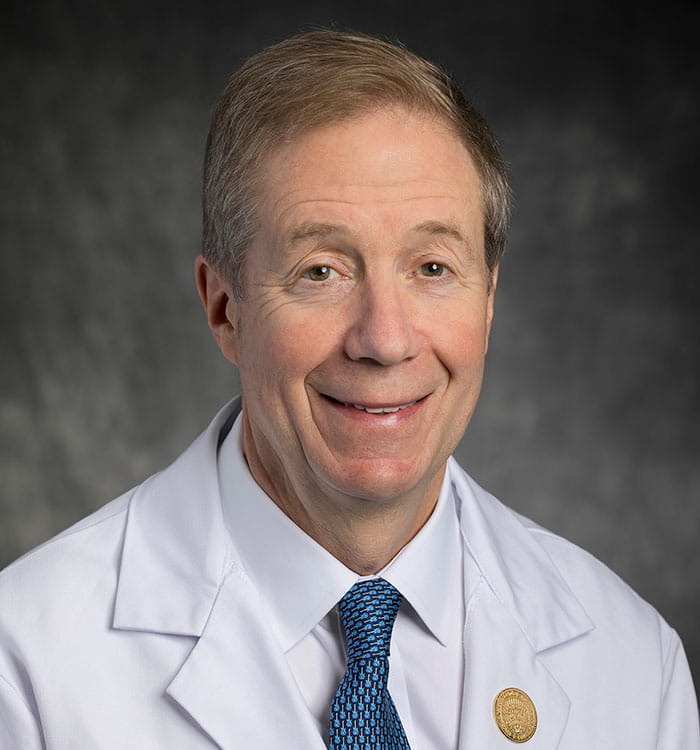Dr. Warren Selman Installed as President of Society of Neurological Surgeons
November 02, 2021
Innovations in Neurology & Neurosurgery | Fall 2021
In May, Warren Selman, MD, began his term as President of the Society of Neurological Surgery (SNS), the oldest neurosurgical professional society worldwide.
 Warren Selman, MD
Warren Selman, MDCurrently Neurosurgeon-in-Chief and Chair of the Department of Neurological Surgery and the Harvey Huntington Brown Jr. Chair in Neurosurgery at University Hospitals Cleveland Medical Center and Professor of Neurosurgery at Case Western Reserve University School of Medicine, Dr. Selman is nationally recognized for his expertise in cerebrovascular surgery, pituitary surgery and the role of mixed reality in neurosurgical education, training and practice.
“The SNS represents a core group of educational leaders in neurological surgery that epitomizes teaching and research,” says Nicholas Bambakidis, MD, Vice President and Director of the UH Neurological Institute, and the Warren R. Selman Chair in Neurosurgery at University Hospitals and Professor of Neurological Surgery at the School of Medicine. “These are the values Dr. Selman has prioritized and excelled at throughout his entire career, and it is a fitting honor for him to serve as president of this prestigious organization.”
This fall, Dr. Bambakidis begins his term as President of the Congress of Neurological Surgeons, the largest neurosurgical association globally and a strategic partner with the SNS. “My colleague and I are proud to continue University Hospitals’ esteemed legacy of national leadership in the field of neurological surgery,” he says.
Dr. Selman epitomizes that legacy at UH. He trained under Dr. Frank Nulsen, the health system’s first Chief of the Division of Neurosurgery, and Dr. Robert Ratcheson, who succeeded him to become the first Chair of the Department of Neurosurgery. As such, Dr. Selman has a direct lineage to the chairs who have led the department. “I'm fortunate — and a rare bird — to have stayed in one place throughout my career,” he says. “Obviously, I have a love for UH and believe it is a wonderful institution.”
A pioneer of research into the brain’s ability to tolerate ischemia from lack of blood flow, Dr. Selman also has advanced the management of patients following pituitary tumor surgery. His recent projects have focused on utilizing mixed reality platforms to plan for and perform complex neurosurgical procedures.
“Using virtual and augmented reality, you are able to visualize critical structures in three dimensions to know not only what you are approaching, but what is behind and around what you are approaching,” Dr. Selman says. “Our work with Surgical Theater, a company founded in Cleveland specializing in mixed reality medical visualization, has shown that mixed reality, when used both before and within the operating room, can improve the safety of neurosurgical procedures. We’ve also partnered with the Interactive Commons at Case Western Reserve University to incorporate mixed reality technologies into teaching our medical students and residents the complex neuroanatomy needed to understand how diseases affect the nervous system and perform neurosurgical procedures safely.”
A Tradition Of Teaching
Dr. Harvey Cushing, one of the founders of modern neurosurgery in the United States, suggested in 1920 that an elite group of physicians interested in neurosurgical technique gather twice annually to share knowledge and advance neurosurgery as an independent specialty, and the SNS was formed.
“There was a strong history of traveling to one another’s institutions to observe operations and learn from one another,” Dr. Selman says. “It was a unique style of mentoring and tutoring that continues to guide our mission today, which is to advance the quality of care of neurosurgical patients by promoting excellence in education and research.”
With more than 200 active members, the “Senior Society” is composed of academic department chairs, residency program directors, and other educational leaders around the country, and is the representative body for neurosurgery to the Accreditation Council for Graduate Medical Education (ACGME).
Advancing The Field
As the number of subspecialties in neurosurgery continues to grow, the SNS committee on advanced surgical training has been working in concert with the American Board of Neurological Surgery to certify specialty fellowships.
“We have neurosurgeons focused on, for example, vascular, tumors, spine, or pediatrics,” Dr. Selman says. “Our goal is to ensure the highest level of quality for education and training in these subspecialty fellowships.”
Over the past century, the SNS has also worked to advance scientific inquiry within the field of neurosurgery. “Part of our core curriculum is to develop a research component so that everyone is exposed to the basic principles of how to set up and conduct meaningful investigation into basic, translational, or clinical projects during their training and be able to carry this on as they move into practice,” he adds. “We want neurosurgeons to participate in research, and we’ve partnered with the Academy of Neurological Surgery to enhance and advance that training.”
A recent SNS initiative has focused on quality improvement. “We worked closely with ACGME’s Program Directors Project on Quality to develop opportunities for residents to participate in quality initiatives within their hospital to implement projects aimed at improving patient safety and quality of care,” Dr. Selman says. “The goal is that when they graduate and establish their own practice, residents are quite familiar with quality improvement and continue to lead in those roles as they go forward.”
Centennial Anniversary
As the SNS marked its 100th anniversary in 2020, leaders pivoted to navigate pandemic challenges. “As always, top of mind was to serve the public interest by delivering the highest quality neurosurgical training,” Dr. Selman says. “We had to rethink how to go about conducting resident applicant interviews in the time of COVID. Our committee on medical students modified and standardized the entire application and interview process to ensure that it is fair and better able to address issues of diversity, equity and inclusion, and in so doing, improved the process for all.”


